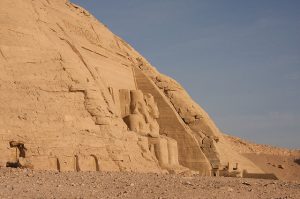An ancient Egyptian master craftsman was known as Nebtawi. His day does not commence all the others have arrived and hence he is free to get up late in the morning.His breakfast is typical with figs, dates, and bread, butter and honey, all washed down with fresh milk. Like most other Egyptians, Nebtawi walked to Egyptian Work- a building site where he is supervising the construction of a new temple.

The building is complete now, so the site is brimming with artists, who are decorating the fresh plaster on the walls. His Egyptian Work consists of checking on the work and stopping occasionally to give some advice or correct some mistakes. His day is fully occupied by meetings with other master craftsmen, who are working (Egyptian Work) on a number of different projects throughout the city. Before he can even realize, his Egyptian Work is over.
His kids persuade him to play sent, a popular board game. Each player has six wooden cones and must get them to the other side of the board and then back again. They throw four wooden sticks to determine how far each piece can move at any one time.
Remmao
Remmao was an ancient Egyptian nobleman. When Remmao got out of bed and put on a long white linen robe, it was like a signal for his secretary to bring him his schedule for the day on a piece of papyrus.
Once she leaves, other servants help him wash and shave. After having breakfast, he leaves for Thebes by chariot and heads for his estate on the banks of the Nile. He meets the estate overseer, who gives him the latest figures on his cattle and geese and updates him on their expectations for the harvest.
These two men then go on a tour, watching slaves carrying baskets full of grapes and pomegranates. The grapes are taken to the wine press where they are crushed underfoot, before being put into clay vessels and taken to the cellars – where they will eventually become wine.
Remmao, along with one of his friends also go to the river to hunt wildfowl. Meanwhile, his wife, Kemisi takes care of the preparations for a banquet dinner to be hosted by them in the evening. The end of the banquet ends the day for Remmao and Kemisi.
Pharaoh was an ordinary man. His day begins with cleaning and dressing by servants. When he is clean, he is dressed and adorned with a huge amount of jewelry as he’s the pharaoh. A pharaoh owned vast amounts of gold and hence needed to look right. The pharaoh then walks to the “audience chamber” to hold his daily meetings. As guests enter the room they prostrate themselves in front of him.
He is a Divine Majesty while they are mere mortals. As usual, there are ambassadors who are offering tributes from foreign countries, generals talking military matters, the usual nobility and some special emissaries from across the empire. Once, the day’s audience is completed, he leaves for the temple.
As pharaoh, it is his duty to pay tribute to the chief god, Amen-Re. It’s a pain but, if he doesn’t do it, the empire could lose its divine order or Maat. It could descend into Isfet or chaos and he would be held responsible. He asks the god some questions and receives answers from the high priest.
The questions over, he is presented with a large bull. After prayers, the sacred butcher cuts the bull’s throat as a sacrifice to the gods.
During noon, the Pharaoh, surrounded by bodyguards, visits some construction sites where magnificent new buildings are being constructed in his honor. Back at the palace, he gets a welcome break.